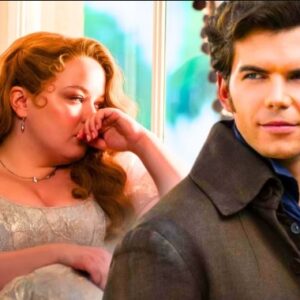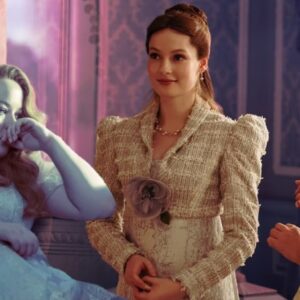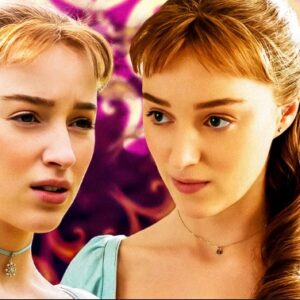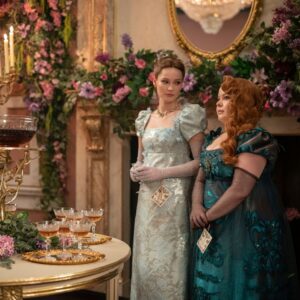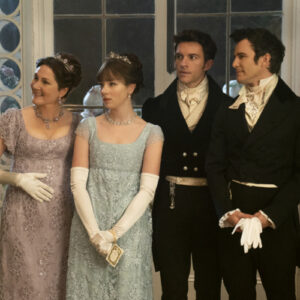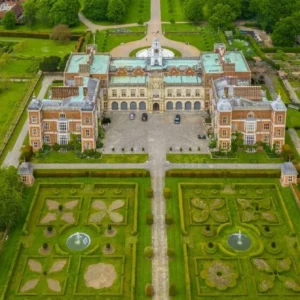Julia Quinn wants everyone to have a happy ending.
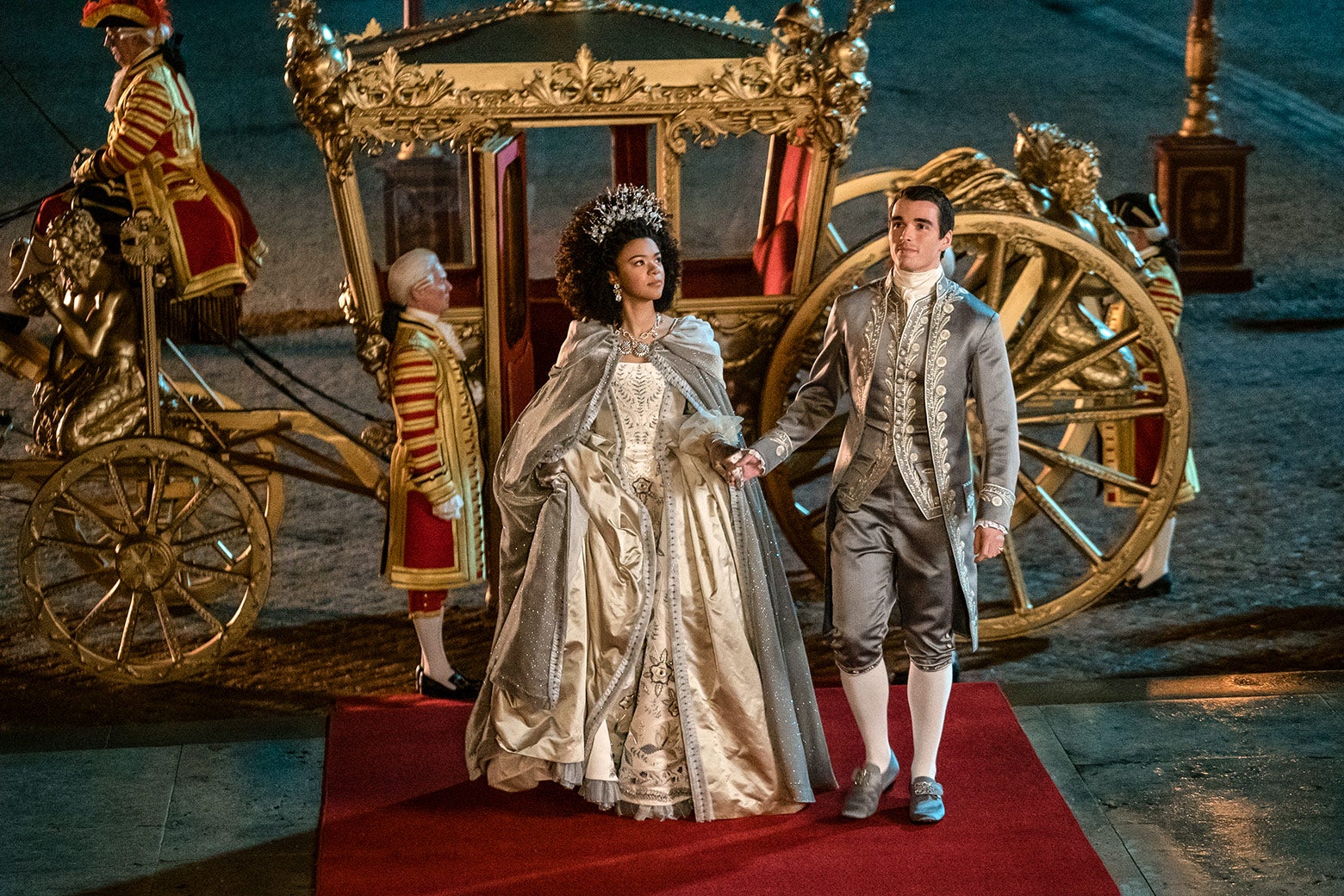
After Bridgerton Season 1 became a monster hit for Netflix in 2020, demand for more of the Bridgerton-verse grew, leading to the show’s early renewal through at least four seasons.
There are nine Bridgerton books out there, written by romance author Julia Quinn, plus Quinn’s Bridgerton prequel series, which is four books long. Unlike the Bridgerton TV universe, created by Shonda Rhimes, none of those books have protagonists of color.
So it’s of note that the newest Bridgerton TV series is not based on a Quinn book, but rather is something totally new. Queen Charlotte, a prequel spinoff, tells the backstory of young Charlotte’s (India Amarteifio) acclimation to her arranged marriage with King George (Corey Mylchreest). The story of Queen Charlotte was created entirely by Rhimes. Then, Quinn used Rhimes’ scripts to write the companion novel of the same name, which will be available on May 9.
This is Quinn’s first attempt at centering a novel on a nonwhite protagonist, and the topic of diversity in historical romance is one that has gotten her in some hot water in the past. (And, as comments on the Goodreads page for the Queen Charlotte book illustrate, Romancelandia has the memory of an elephant.) I talked to Quinn about what this reverse writing process was like, and what she was thinking when she said what she said about romance, Black protagonists, and happy endings back in 2017. This interview has been edited and condensed for clarity.
Nadira Goffe: How did you come to the decision to tell Queen Charlotte’s backstory? Had you always wanted to? Or did you decide to do it after the positive response to the first two seasons of the show?
Julia Quinn: So this one, I have to give it all to Shonda [Rhimes]. Or actually to [Netflix co-CEO] Ted Sarandos’ mother-in-law. I’m not kidding. After Bridgerton came out, his mother-in-law said, “You should do something on Queen Charlotte.” Then he started thinking about it and he said something to Shonda. And Shonda, of course, was like, Oh my gosh. Yes. And then I only came in when Shonda called me to tell me that they’d already greenlit the project and they were going to do a television show.
Oh, wow.
I mean, Queen Charlotte’s not in any of the books. She’s a real historical figure, but she’s not in the Bridgerton books. And she was hands down my favorite change that they made to the show, half because of the fabulous writing and half because of [actress] Golda Rosheuvel. So I thought it was a great idea. And then my husband, as soon as I told him, said, “You have to write the book.” And I said, “What? I don’t know. It’s kind of reversed. It’s reverse engineering.” But then the more I thought about it, the more I thought it seemed like a really cool and interesting project. So at the Bridgerton Season 2 premiere, I mentioned it to Shonda: So, we’ll have the books that made the show, that made the show that made the book. And she told me later that she had been thinking about the same thing.
The synergy between you two!
Yes! So I can’t take any credit for the idea to do something on Queen Charlotte.
You said that Queen Charlotte was one of your favorite additions that the Bridgerton television series made to the story. Could you expand on that?
Well, I think there’s two parts to it. One part is just as a plot element, she serves this great purpose in providing a framework to the show in a way that helps make a romance novel work better for the screen. Because there’s certain things that work best in different formats or media—things that work great in a novel don’t necessarily work great in a show, and vice versa. And I think having her there as this kind of figure at the top of the society, kind of forcing everybody into this, OK, we get to open with the [young women] getting presented. Everybody’s worried about who’s going to be the diamond. It provided this great framework that they can use from season to season. And on paper, it’s fabulous. And then you bring in Golda’s performance, which just transcended everything.
You mentioned before that there are certain things that work for novels that might not work for a television adaptation. In that same vein, what are the differences you noticed between working with Rhimes on the TV series versus writing the books? Are your processes different?
Well, to be completely frank, I have no direct knowledge of Shonda’s process, because we didn’t work together holed up in a room. What we really did was take turns with what we did best and what our expertise is. So she wrote six scripts—two of them she wrote with someone else, but for the most part, she wrote six scripts—then handed them off to me. And then I took those scripts and figured out how to turn them into a novel. And I checked in with her a few times, but for the most part, she just said, “You do what you know how to do.” Then she said, “I don’t know how to write a novel. I know how to write a television script.” It was a huge compliment, just the level of trust she had. It was really exactly what happened with [the first two seasons of] Bridgerton, when I retained no creative control. Because, I said, “Look, I’m not going to tell Shonda Rhimes how to make television. She knows what she’s doing.” And obviously she did! And she basically did the same thing for me, [in giving Queen Charlotte over to be made into a book,] which was an honor, to be honest, to be a recipient of that trust.
So, you had the scripts that Shonda had written, and you already had the first two seasons of Bridgerton to build on. But did you do any more historical research to write Queen Charlotte?
For the most part, I really took Shonda’s lead on this one. Especially when she was dealing with issues of race—I mean, for one thing, because [the idea that Charlotte may have been part Black] is historical speculation, not complete historical fact. So I really wanted, in issues like that, to follow her lead and delve into it with the same depth and tone that she did. I wanted to keep it even that way. But a lot of other things, I brought in from my research.
For example, one thing that is true in history that we didn’t do in the show is show the fact that Queen Charlotte actually didn’t speak a word of English when she got to England. The show never really touches on the fact that her first language is German. And so, in the book, I had a lot of fun with that, because I’ve always loved, for example, big, long German words. In at least three or four places in the book, you have a moment in her head where she is frustrated because if it were in German, she could have figured out a word for something.
These are small things, but things that I think round out the character more. I looked into the fact that both she and George actually had a lot of brothers and sisters. You see one of her brothers in the show, but that’s not really mentioned. And they don’t actually show up as characters in the book, but it is mentioned there, and it’s part of rounding out the character even more. And then also, I did visit the set.
Did that change the way you were going to write Queen Charlotte?
Something that I’ve said in dozens of interviews is that I’m not a particularly visual writer. Because people always say, Oh, the Bridgertons, is that how they look to you? And I would think, I don’t even know how they look to me, to be honest. I’ll say this person has green eyes and that person has blue eyes, but I’m not one of these writers who really pictures them. So this was great, because this time I really did have pictures as I’m writing them. I knew exactly what they looked like. And, more than that, because I had gone out and met [the actors] and then later got early cuts of the show, I even knew how they moved and how their faces made expressions. That was a really different writing process for me and very, very interesting.
I do have to ask this, because I’ve seen some talk of this online: A paraphrased quote from you is floating around the internet, sourced from people who attended book events in 2017 in which you were a panelist. Allegedly, you said that you don’t write Black characters in your historical fiction because you don’t want to write about characters who are suffering.
Obviously, this is a boiled-down quote that’s been passed down telephone-style from multiple different sources, so I’d love to hear your side on that.
So, in 2017, I spoke awkwardly about race. It has definitely coalesced into something that’s not entirely accurate, but I certainly was not articulate in my thoughts. I also think that I was under the apprehension, at the time, that in order to really honor Black history—well, I mean, there are obviously many other marginalized groups, but, to your question, Black history—you had to be truthful about the various traumas and the history. Because the last thing I ever want to do is whitewash history in a way that removes Black people from spaces where they actually were. And so, I really thought at the time that it would be disrespectful to try to go into history and pretend that these terrible things had not happened.
So, that’s really where I was coming from and I don’t think I said it very clearly. And I think that since I muddled it, then other people muddled it. And it’s really, it’s something that’s been very difficult for me, and to see it get muddled more and more, it’s upsetting. But on the other hand, when you make mistakes and you don’t say things clearly, you have to own it and you have to deal.
I think it’s great, honestly, the way that Shonda has opened up the Bridgerton world [through casting people of different races and introducing race into the story]. Overall, the thing I feel most is gratitude, because they were able to do something that, honestly, I didn’t know how to do. And also, even if I tried, I couldn’t have done it as well. I don’t have the same life experiences. That’s the thing about television, it’s such a collaborative process that we can talk all about—Oh, this is so revolutionary. We’ve got Regé-Jean Page there and we’ve got Simone Ashley there. But what you’re not seeing is who’s in the writer’s room, who’s in the director’s chair. It’s an incredibly diverse group of people. I mean, the scenes that you see in Season 2, of the Haldi ceremony, that didn’t come up in a vacuum. That’s because there’s really smart, wonderful women, in the writers’ room, of Indian descent. And these are things I wouldn’t have known how to do. So, I love that there’s now a group of people making this more diverse and inclusive.
And what I’m realizing now, or I have realized, is just how important representation is. And I don’t think that’s something I understood earlier. I mean, in an academic way, yes. But now, after sort of living through it and hearing from people and hearing what it has meant for them to see somebody like them, I really do understand now—or hope I understand now, I should say, because let’s be honest, I will never walk in the shoes of anybody who doesn’t look like me—is how important it is for people not just to see themselves in the story, but to see themselves in a story with a happy ending. And that I really didn’t understand before. Again, because I thought I had to honor history by not …
… sanitizing the traumas that these people have gone through.
Thank you. See, you’re saying it better than I! That’s the thing. I think I was being so careful, I was so focused on that that I didn’t realize how important it was for everybody to be able to see themselves in a happy ending.
How did you and Shonda decide what parts of Bridgerton Season 1 and 2 you’d want to amplify or talk about? Or which smaller characters you’d want to bring back?
I really had no part in the plot structure. I got the scripts and worked off that. So the very, very early decisions were all her. One thing I did do, actually, was pull some elements out. So, for example, the novel really only looks at the earlier timeline. I read the scripts many times before I even dug in, and I just realized that I really wanted to make the novel as close to a romance novel experience as you could get.
I mean, obviously it’s not going to be, because we all know what happens to King George. And I just realized, again, this is something that works great on the screen that is much more difficult to do in a book, this flashing back [and moving between] timelines. For the story to work, we didn’t actually need that second timeline. And then, because that was gone, we ended up not including the storyline of Lady Danbury and Violet’s father. Because so much of that storyline, I felt, was linked into watching Violet and Agatha’s friendship in present times and we didn’t do that. It just kind of made sense. And even without that, the book’s like 100,000 words. And I was just like, We don’t have room!
Are there any other characters that you’d like to write solo books about? I know that there are some prequels and that Violet has a short story. But perhaps a Violet book or Brimsley book?
